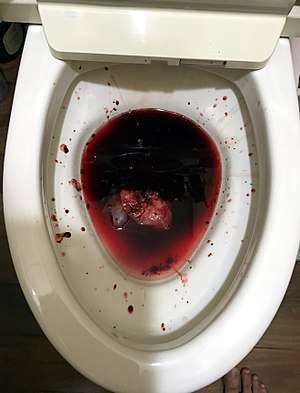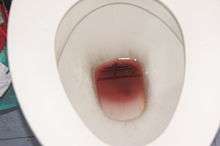Hematochezia
Hematochezia is the passage of fresh blood through the anus, usually in or with stools (contrast with melena).[1] The term is from Greek αἷμα ("blood") and χέζειν ("to defaecate"). Hematochezia is commonly associated with lower gastrointestinal bleeding, but may also occur from a brisk upper gastrointestinal bleed. The difference between hematochezia and rectorrhagia is that, in the latter, rectal bleeding is not associated with defecation; instead, it is associated with expulsion of fresh bright red blood without stools.[2] The phrase bright red blood per rectum (BRBPR) is associated with hematochezia and rectorrhagia.
| Hematochezia | |
|---|---|
| Other names | hematochezia |
 | |
| Specialty | Gastroenterology |
Signs and symptoms
Hematochezia from upper gastrointestinal, small bowel, or colonic sources can present with moderate to large volume bleeding, whereas patients with rectal or anal outlet bleeding usually present with ‘drops’ or ‘streaks’ on the stool or toilet paper.[3]
Causes
In adults, most common causes are hemorrhoids and diverticulosis, both of which are relatively benign; however, it can also be caused by colorectal cancer, which is potentially fatal. In a newborn infant, haematochezia may be the result of swallowed maternal blood at the time of delivery, but can also be an initial symptom of necrotizing enterocolitis, a serious condition affecting premature infants. In babies, hematochezia in conjunction with abdominal pain is associated with intussusception. In adolescents and young adults, inflammatory bowel disease, particularly ulcerative colitis, is a serious cause of hematochezia that must be considered and excluded.
Hematochezia can be due to upper gastrointestinal bleeding. However, as the blood from such a bleed is usually chemically modified by action of acid and enzymes, it presents more commonly as black "tarry" feces known as melena. Haematochezia from an upper gastrointestinal source is an ominous sign, as it suggests a very significant bleed which is more likely to be life-threatening.
Eating beetroot can cause harmless red-colored feces (beeturia) because of insufficient metabolism of a red pigment, and is a differential sign that may be mistaken as hematochezia.
Consumption of dragon fruit (pitaya) or blackberries may also cause red or black discoloration of the stool and sometimes the urine (pseudohematuria). This too, is a differential sign that is sometimes mistaken for hematochezia.

In infants, the Apt test can be used to distinguish fetal hemoglobin from maternal blood.
Other common causes of blood in the stool include:
- Colorectal cancer[4][5][6][7][8]
- Crohn's disease[9]
- Ulcerative colitis[10]
- Other types of inflammatory bowel disease, inflammatory bowel syndrome, or ulceration
- Rectal or anal hemorrhoids or anal fissures, particularly if they rupture or are otherwise irritated
- Shigella[11] or shiga toxin producing [12] E. coli food poisoning[13]
- Necrotizing enterocolitis
- Diverticulosis[14]
- Salmonellosis[15]
- Upper gastrointestinal bleeding[16]
- Peptic ulcer disease[17]
- Esophageal varices[18]
- Gastric cancer[19]
- Intense exercise, especially a high-impact activity like running in hot weather.[20]
- Radiation proctitis
Consideration
A complete blood count as well as an hemoglobin test should be performed when a patient presents symptoms of hematochezia.[3]
Epidemiology
Hematochezia is a common clinical presentation, reported in up to 15% of adults in the primary care setting, and estimated to be responsible for an annual hospitalization rate of 21 per 100000.[3]
See also
References
- Taber's Cyclopedic Medical Dictionary. Donald Venes. 20th Edition. Page 955.
- Sáenz, Roque; Valdivieso, Eduardo. "Approach to lower gastrointestinal bleeding" (PDF). p. 2. Archived from the original (PDF) on 2013-12-13.
- Eckmann JD, Chedid VG, Loftus CG (2018). "A rational approach to the patient with hematochezia". Curr Opin Gastroenterol. 34 (1): 38–45. doi:10.1097/MOG.0000000000000409. PMID 29059071.
- "Colon Cancer Symptoms - What are Colon Cancer Symptoms". Coloncancer.about.com. 2009-01-20. Retrieved 2012-01-31.
- "Colon cancer: Symptoms". MayoClinic.com. 2011-08-13. Retrieved 2012-01-31.
- Lenz, Heinz-Josef (2009-03-06). "What are Early Symptoms of Colorectal Cancer? Watch out for Small Changes". Alexandria, Virginia, United States: Fight Colorectal Cancer. Archived from the original on 2009-03-10. Retrieved 2013-02-23.
- "Colon Cancer Symptoms - Colorectal Cancer Symptoms". Webmd.com. 2010-10-31. Retrieved 2012-01-31.
- "Crohn's Disease: Inflammatory Bowel Diseases (IBD): Merck Manual Home Edition". Merckmanuals.com. Retrieved 2012-01-31.
- "Crohn's disease: Symptoms". MayoClinic.com. 2011-08-09. Retrieved 2012-01-31.
- "Ulcerative Colitis - Symptoms, Causes and Treatments of Ulcerative Colitis". Webmd.com. 2010-10-07. Retrieved 2012-01-31.
- "Causes and Symptoms of Shigellosis". Minnesota Department of Health. Archived from the original on 2017-05-02. Retrieved 2015-05-22.
- "Escherichia coli O157:H7 (E. coli O157)". Minnesota Department of Health. Archived from the original on 2017-06-02. Retrieved 2015-05-22.
- "Symptoms of E. coli Infection | E. coli Food Poisoning". About-ecoli.com. Retrieved 2012-01-31.
- "Diverticulitis: Diverticular Disease: Merck Manual Home Edition". Merckmanuals.com. Retrieved 2012-01-31.
- "Salmonella infection: Symptoms". MayoClinic.com. 2011-04-16. Retrieved 2012-01-31.
- Upper Gastrointestinal Bleeding at eMedicine
- "Peptic ulcer: Symptoms". MayoClinic.com. 2011-01-06. Retrieved 2012-01-31.
- "Esophageal varices: Symptoms". MayoClinic.com. 2010-10-30. Retrieved 2012-01-31.
- Gastric Cancer at eMedicine
- Davis, Matthew; Davis, Peter; Ross, David (2005). Expert Guide to Sports Medicine. American College of Physicians. p. 136.